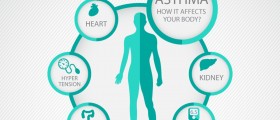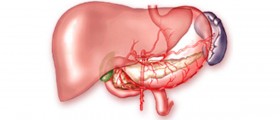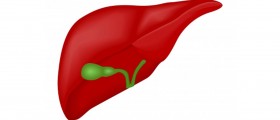A cluster of malformed blood vessels is known as hemangioma. This can happen anywhere in the body, including the liver, in which case it is known as liver or hepatic hemangioma. In most cases liver hemangiomas are benign and cause no symptoms. They may also vary in size, from ¼ of an inch up to 2 inches (5.08 cm). Sometimes, liver hemangioma may cause abdominal pain and patients rarely complain about sharp pain in their stomach caused by this problem.

Women are found to be more likely to develop this condition comparing to men, especially women who already have children and being in the 30 to 50 age group. Additionally, hepatic hemangiomas are also likely to appear in menopausal women on hormone replacement therapy.
Causes and Symptoms of Liver Hemangioma
Since there are so many women suffering from this problem, scientists believe that female hormones such as estrogen have something to do with this condition. Another reason why scientists link estrogen and hepatic hemangioma is size of these benign growths. Most hemangiomas found in women are much larger than those in men. Hemangiomas may also appear in small children, even in babies about 6 months old. In some cases liver hemangioma has been blamed to be a cause of heart failure or sudden death in babies.
Most people having liver hemangioma do not have any symptom and do not know about their hemangioma until it gets detected on MRI (magnetic resonance imaging) or CT (computed tomography) scans due to some other medical problems.
Some patients may notice discomfort or abdominal pain caused by hepatic hemangioma, usually located exactly on the spot of hemangioma. This benign growth may affect functioning of the nearby organs and cause discomfort and pain. Patients also reported nausea after eating and vomiting or fullness after eating small portions of food. In rare cases, hemangioma can burst and cause internal bleeding, which must be treated immediately.
Pain Management
Doctors do not recommend any treatment for liver hemangiomas which do not hurt. Also, patients without symptoms do not require any treatment at all.
Extremely painful hepatic hemangiomas are treated surgically as well as hemangiomas which present a threat to functioning of some other organs in the body. Embolization is the least invasive surgical treatment. It uses emboli to block blood vessels and cut the blood supply to hemangioma. As a result, the benign tumor shrinks and pain should be significantly decreased.
Radiation is another treatment option for liver hemangioma pain. Sometimes hemangioma may damage the liver and this requires liver resection surgery or even liver transplant, if necessary.

















Your thoughts on this
Loading...